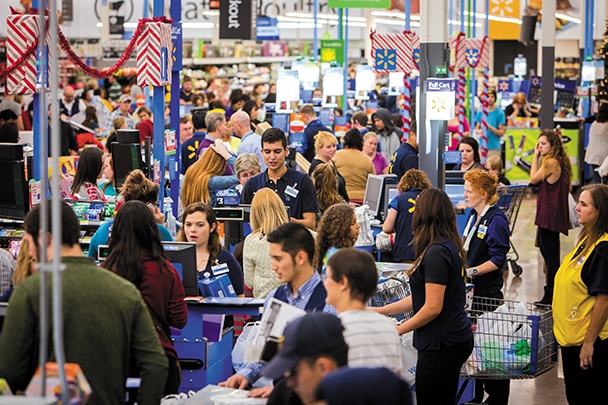Retail Report: Amazon news and which retailers will open Thanksgiving Day
by October 24, 2016 12:00 am 154 views

Retailers Decide to Remain
Closed on Thanksgiving Day
It’s like clockwork. Once summer is over and the kids are back in school, the media begins rumbling about the specter of Black Friday. Retailers announce layaway plans, and leaks to the media boast of unbelievable discounts on the latest toys and electronics.
In the past few years, there has been a question of which stores will open earliest on Thanksgiving Day.
“Retailers trying to open earlier than their competitors on Thanksgiving Day has become something of a Cold War over the past few years,” according to a recent article on PYMNTS.com. “In 2014, Macy’s announced that it planned to open at 6 p.m. on Thanksgiving, two hours earlier than the previous year, and stores like Kohl’s and Sears soon followed suit by announcing that they too planned to open at 6 p.m. on Thanksgiving, according to a Time report. When Macy’s announced that year that it would open its doors at 6 p.m. to shoppers, JCPenney then announced that it planned to open its doors at 5 p.m.”
Naturally, such news inspires debate. Scolds and moralists proclaim the immorality of forcing store employees to come into work on a day that has traditionally been spent with loved ones.
On the flipside, free market advocates note that many employees actually volunteer to come to work on Thanksgiving, often receiving higher wages or first dibs on time off at Christmas or New Year’s Eve. Counter-scolds also remind anti-Thanksgiving shopping campaigners that low-income families often rely on these sales to ensure that their children will have a good Christmas.
It appears, however, that at least one side is gaining some traction in this particular culture war. Minnesota-based Mall of America has declared that it will be closed for the entirety of Thanksgiving Day. Washington-based outdoor apparel retailer REI, Massachusetts-based Staples, Crate & Barrel of Chicago and Sam’s Club will also remain closed.
Still, many major retailers, including Wal-Mart Stores, Sears and Kohl’s, intend to open on Thanksgiving to allow customers a chance to do some early shopping while working off some calories in the aisles.
Will Amazon Open
Convenience Stores?
The Wall Street Journal recently reported that Amazon is planning to launch a chain of brick-and-mortar convenience stores. Amazon itself hasn’t confirmed the story, but sources and journalists describe an elaborate plan codenamed “Project Como.”
Amazon has been working hard to become a grocer in its own right. It got its start by selling non-perishables online and through its special flat-fee shipping Amazon Pantry program. Over time, it expanded its range with the Amazon Fresh grocery delivery program as well Prime Now, an on-demand service that delivers groceries from Amazon’s own warehouses as well as local stores.
As some journalists have pointed out, opening physical stores may have another purpose beyond convenience. The stores themselves would serve as distribution centers.
“These stores are onramps to the company’s online grocery service, Amazon Fresh, which delivers stuff to your door. And they’re giant advertisements for Amazon Fresh,” according to a recent Wired article. “But they can also double as distribution centers. They [are] additional outposts in the vast Amazonian distribution network that is slowly stretching across the planet. You need places that can move all the fresh eggs and milk from week to week, and they might as well double as stores.”
Analysts have noted that Wal-Mart Stores has had a significant advantage over Amazon in the retail wars because Walmart already has buildings on the ground. If Amazon can gain some brick-and-mortar momentum through its prototype bookstores and convenience stores, it may, over time, be able to overcome this advantage and increase its market dominance.
Amazon Puts a Stop to
“Incentivized” Reviews
One of the benefits of online shopping is being able to read product reviews, and Amazon is the granddaddy of consumer review collections.
Unfortunately, some have questioned the integrity of many online reviews, including those on Amazon. A high number of good reviews not only affects consumer perception of a product but can also raise a product’s listing to a more favorable position in page displays and search rankings.
As a result, desperate Amazon sellers have sometimes resorted to a variety of tricks in hopes of getting more and better reviews. Some have hired people to write positive reviews, which has long been a violation of Amazon’s terms of service.
Another technique was for a seller to provide free or deeply discounted products to consumers, in hopes that users would write a positive review. Until recently, Amazon allowed sellers to “incentivize” reviews in this way, provided that the reviewer would issue a disclaimer within the review that he or she had received a free or low-cost product in exchange for a review. Now, however, Amazon has decided that even this is no longer appropriate unless the user is part of Amazon’s own in-house Vine Reviewer Program.
Many analysts believe that this shift is a good one, even though it may present some hardship to smaller companies that are eager to promote their products on Amazon. For these suppliers and sellers, the work of getting customers to buy and then review products will once again be a matter of developing strong in-house marketing systems and developing the best products to get reviews.
